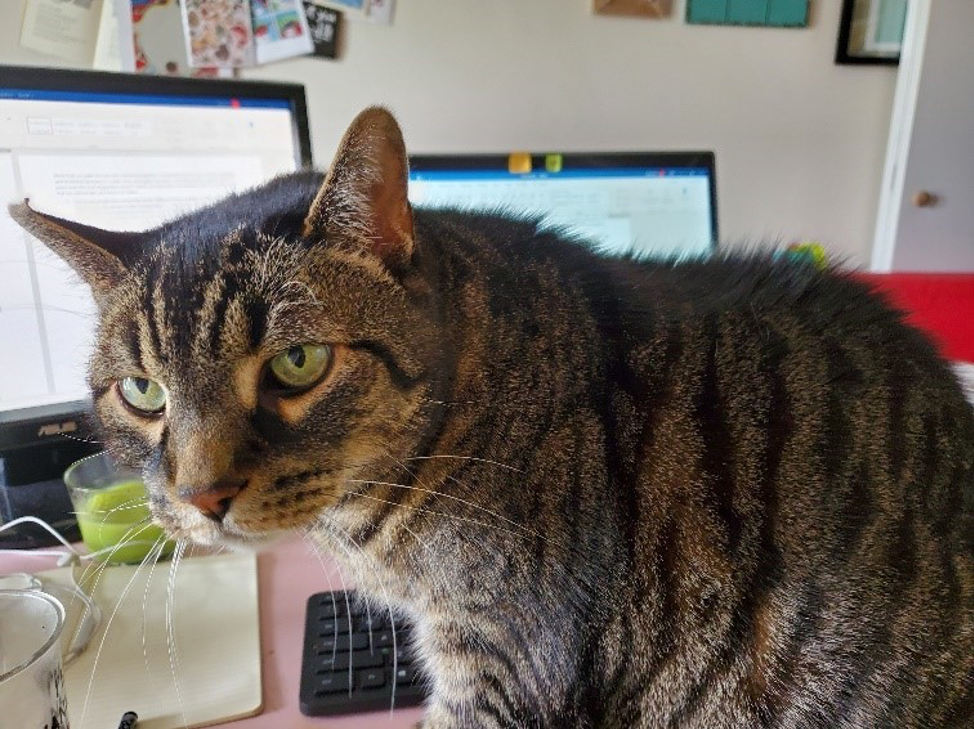It’s always hard to write. Even as someone who loves writing, I hate sitting down to actually do it. Especially now, with the paradoxical pandemic life of being exhausted, wired, busy, bored, lonely, and completely overwhelmed with Zoom-based social activities, it’s really, really hard to write my seemingly endless dissertation.

In the before-times, I would go to a local coffee shop and set myself up for some pomodoro-style writing bursts, preferably with friends and colleagues. My supervisor even set up a weekly Write Club (the first rule of Write Club is “Tell Everyone About Write Club”) in her kitchen with coffee always ready and waiting! There, I would gather with friends to grumble about writing, get some done anyways, and cheer each other on.
I can’t do that now. There’s no coffee shop with low-level ambient chatter, no group of friends gathering around a coffee machine, and, I thought, no way to create the community of fellow writers that I depended on.
Thankfully, the WCC has started running Virtual Writing Cafés for graduate students and faculty. True, there’s no pre-made coffee, and I’m still just sitting at my own desk, alone in my house (with a needy cat). But there is a group of writers who commit to writing bursts with breaks (aka Pomodoro) that I can commiserate and celebrate with, and that group is essential to my writing process today. Knowing that other people are (grumpily, even) sitting down to do some writing (any writing) helps keep me accountable, and getting to share pictures of pets in the breaks keeps me motivated!

Figure 1 The author's view of said needy cat (Horatio) as she drafts this very blog post
If you’ve never attended a writing group before, here are my hard-learned lessons about how to get the most out of the Virtual Writing Cafés:
Accept that writing is a social act. People tend to think of writing as something that you do alone, but Helen Sword, who studies successful academic writers, has found that strong social habits are essential. Talking to people about your writing--your plans, your fears, your successes, your struggles--makes you a better writer.
Get to know your fellow café-goers. Part of what makes a writing group effective is accountability and support, so join in on the chat and say “hi” to your fellow writers. If you can create rapport and develop relationships, you can rely on those relationships to support you when you need it. So, share good news, writing goals, and your progress in the chat (and also share your pet pictures, please). Be someone whose absence is noted and whose presence is welcomed, and you will find yourself with a community of support.

Start small. Don’t set yourself up for disaster by trying to attend every single writing group you can find, because that’s a ticket to Disappointment City. Commit to one a week until it starts to feel like a habit and then, if it feels right, you can slowly increase your writing groups. Don’t do more than you can sustain and remember that when it comes to writing, anything is better than nothing!
Create a writing space. One of the best side-effects of joining an in-person writing group is that it creates a unique writing space. By literally moving where you write, you can trick your brain into a new mental space, which can make starting a hard task a little easier. Although we hold our writing groups virtually these days, you can still recreate that feeling. You could write at the kitchen table instead of a desk, or set yourself up in a cozy nest on your couch. Or, if (like me) you can’t change where you write, you could create that mental space instead by doing something special during the café. Pick a fancy tea to drink during the café or hide a stash of chocolate to snack on during breaks to make that time feel different.

Commit to the writing burst. In the Writing Cafés, we do 30-minute writing bursts, and it’s so important to treat that time seriously. Close any browsers that aren’t necessary for your writing task, turn off your social notifications, move your phone somewhere it won’t distract you, and tell your family and/or roommates not to disturb you while you’re on your “pom” (short for “pomodoro”).
Commit to the break. Similarly, when it’s time to take a break, take it. We take 5-minute breaks where you should be standing up, stretching, and/or participating in the chat. Regardless of how you spend your break, do not look at your writing. It’s a bit counter-intuitive but the break time actually improves your focus. For me, knowing I have a break coming up stops me from checking Twitter (usually) and keeps me on-task.

Don’t nitpick; cheerlead. Support others when they share their accomplishments, offer positive suggestions when people ask for advice, and don’t forget to do the same for yourself! It’s hard to do anything these days, so reward yourself for attending and avoid berating yourself for what you think you could (or should!) have done.
Now that you know how to get the most out of a writing group, it’s time to find one! You are always welcome to join us in our Virtual Writing Cafés, but you can also organize your own. All you need is a timer (we recommend Tomato-Timer) and at least one other person who wants some focused writing time. You can do this over video (like I do with my supervisor), over audio (like I do with my BFF), or if you don’t need yet another zoom call, on social media. You can often find folks on Twitter looking for Pomodoro buddies through hashtags like #PhDChat and #AcademicChatter.
Writing can feel lonely (especially these days, when everything feels lonely) so it’s important to reach out to people going through the same thing. Luckily, pretty much everyone has a hard time writing, so you can always find a sympathetic ear in a writing group.